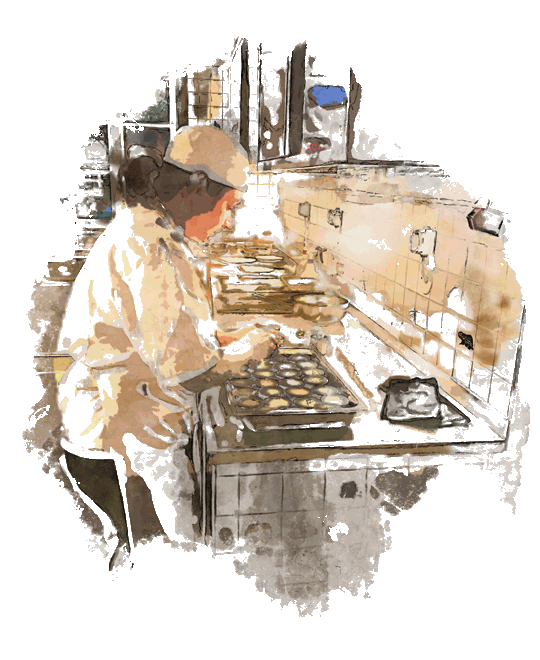The day begins at night. The guests have left, we have washed down the kitchen, and now we sit down in the restaurant — or the courtyard, if the weather allows for it. We are a little tired and a little satiated by it all. We laugh a bit and talk about what happened over the course of the evening. We clear the air if someone’s toes have been stepped on, if someone has been too harsh, or if someone needed to be more present during dinner service. It is a soft recap of the evening, with-out being systematic. While this is going on, we also put in orders for deliveries and go through what is needed for the following day. Some people go home and kiss their loved one, others go out on the town. And seven or eight hours later we meet again.
We see each other more than we see our families. Some might think that our world is ruthless and brutal. We love it.
At 10 am every day we eat breakfast and drink coffee at table 70, the large round table facing Kongens Nytorv. We are seven chefs and we awaken slowly. We talk about what needs to get done today, how many reservations are in the book, and whether some stations will be so busy that it is necessary to move people around a little to avert any weak links. It is pretty synergetic.


Then we get a move on. People go to their stations: A chef and a trainee at the meat, a chef and a trainee at the fish, a chef and a trainee at the cold section. And the chef in charge of running the pass. It is less than 10 hours since they stood there last, but the hard work starts now. The big heavy pots get thrown on the stove; the freshly delivered animals are broken down; the fish is filleted; stocks are simmered. The vegetables are rinsed and put in their place.
Our day is set-up to enable us to hit the wall as beautifully as possible. The wall —that is when 200 guests surge in and we have no idea what they will order. We have 30 dishes but no menu. Therefore, we do not have the luxury of predict-ability. Sometimes we die at the wall, but it has to be a beautiful death. Service isn’t just a climax; it is a real explosion. Day in and day out.
We take a break early in the afternoon where we look each other in the eyes over a cup of coffee and some cake, maybe some leftovers from the previous day, if people are hungry — which they very often are. Then we assess the entire situation. Has anyone fallen behind in preparing their stations? Is anyone underwater and in need of rescue?
It takes between 20 minutes and half an hour. And then we continue. And now the race against time begins.
Everyone knows what they need to do.
In the basement, for example, where The Cold Section works, they know that now they need to take the bread dough out and start baking the rolls. They know that they need to be done making avocado terrines before 4pm, and that they need to put the rolls in the oven at 4 pm sharp. They know that the basement needs to be washed down before we have dinner at 4:45pm, and they also know that those with a free hand will help wash down the basement.

In the kitchen upstairs, The Meat and The Fish rearrange their stations in anticipation of guests arriving. They set out the items that need to be brought to room temperature: vegetables, herbs, cheeses, whatever is on the menu that night. It’s called mise en place in chef language, but is really like preparing an ammunition depot — everything must be set up so that it is ready to be fired, no matter what dish is ordered. Everything is in a straight line, so that nothing slows down the process unnecessarily.
The waiters arrive at work while we eat dinner. At full capacity, there are 23 of us, give or take. Seven chefs, two bartenders, nine waiters, two hostesses, a restaurant manager, two or three dishwashers.
We sit together and chat. The chefs most often go outside for a smoke and then return to eat. While we wait, the dishwashers go out to wash down the kitchen so that it is completely clean upon our return. We have a half-hour break, but often people eat their food in six or seven minutes; the remainder of the time we just chat, play with our phones, laugh at something. It is pretty laidback but, to use a cliche, it is the quiet before the storm.

Now it starts. We return to the kitchen and prepare for the train to strike us. The train consists of perhaps 200 guests, and we have no idea what they will order. No two days are alike, but at the same time all days are alike, because all the preparations are made to protect ourselves against what will happen, so that the dinner service will be as good and as beautiful as possible. We have now entered a zone, especially the chefs. They radiate concentration. But it is still too early for their eyes to shine with adrenaline. That is coming.
The guests begin to arrive. The orders tick into the kitchen. The battle has begun. Hopefully we’ll get hit a bit in the beginning. That is optimal, because then you awaken immediately. Like in a boxing match where you receive a single hit to the kidneys or the head so that you get knocked down but aren’t in any real danger. Then you get up and say: “Ok, now we are getting serious! I need to be present in the moment, because I will lose this game if I don’t get a handle on things.”
Because it IS a battle. A battle that we are fighting while everything looks like a show.
The guests have come to experience the show, not the battle.
When they arrive, the light in our open kitchen is dimmed, as are the voices. The chefs stand at their stations, calm and concentrated. They are ready to deliver fully, as they did yesterday evening, and as they will again tomorrow evening.
Behind us, the dark marble wall shines, to our sides are guests seated: at the windows, at the bar, around the high table. We are surrounded.
Orders come in. Then more and more and more. The tempo is constantly rising. It is the chef in charge of running the pass who manages the battle. It is him who calls the food tickets. It is him who approves each dish before it leaves the kitchen. More tickets, more food, more, more, more. No matter the chaos, the guests must not sense it. They must enjoy the meal, the evening, the life, the show. In order to make it count, we must die beautifully.

The kitchen is designed so that no one will die. But it is an illusion. It is not just a question of whether you die, when the tickets pour in; it is always a question of how you die. We have chosen to design the space so that every guest can see us. We have created a kitchen that is as open as humanly possible. There are no walls, only two pillars, and no shelves whatsoever. We can see everyone, everyone can see us. And we do everything we can to hide the friction so that the guests do not notice it — that is how you die beautifully. Therefore, we speak to each other cordially. We may have to say something in a very direct tone. You may need to command, because there is no time to conduct a democratic vote or a survey in the middle of dinner service. For outsiders, the language may be primitive; the reality is that it is the only language that you can understand in the moment. We do have a rule that we must speak nicely to each other, even when we are under the greatest pressure.
At the stations, the chefs move in triangles and make no unnecessary movements — The Fish, The Meat, The Cold. The expediter in front, everyone can see each other, everyone can speak to each other softly, no need to shout. We have constructed a pathway for the waiters and the dishwashers so that they can glide around the open kitchen quickly without colliding with busy chefs or guests at the bar. The kitchen is built so that the dishwashers in exactly four seconds — not three or five — can deliver another set of clean pots and pans to the chefs and then make themselves invisible once again. Every square millimeter has been deliberated and tested. From a distance, it looks easy and lively. That is part of the show. Up close, it is military precision and that is part of the battle.
But, of course, you can lose a battle. We choose to see it as a lesson learned. Of course, a human being cannot perform flawlessly in all infinity no matter how much we may desire to do so. We have created the best possible system, but the system allows for two weaknesses: When the kitchen becomes swamped by orders. And when someone makes a mistake. In the first case, the system works even if the chefs hit the wall. In the second case, the mistake means that the system does not work.

There is nothing wrong with being run over. But when someone forgets the system, you must intervene. Here you have two choices. It is not an option to let it slide. Because then it will happen again. Thus, there are two possibilities: One is, so to speak, to kick the ball so that it rolls down the mountain even faster. Don’t waste any time, split up the team, scold them, let them know that you are watching them, that you are disappointed. With this punishment, they become weighed down by the feeling that you are hovering over them. They are stamped with a social tattoo which divides the team, yet the advantage is that they will never forget it. Therefore, they will choose to follow the system next time. The other model also hurts, but not as much: You can choose to put your foot down, halt the mistake and its consequences, maybe also its’ causes. Say to someone: “Go outside and breathe for five minutes.” It is tantamount to saying to Ayrton Senna back in the day: “Pull over and spend five minutes in the pit” while all the competitors race away. But sometimes it is necessary.
Otherwise, it can be a shit service. Then the sound of the ticket printer becomes the scariest noise in the world. An hour can be the longest of your life. That is why you must abide by the system. There cannot be a single hole in the stations. Because then we can stand there and say: “You can shoot us down, but we will not die.” Then we can continue running on adrenaline, a bit dizzy, like when you lift weights that are too heavy in the gym. We can go on at a pace where we do not stop for a sip of water, even if we are thirsty. And if someone breaks, succumb to the battle, we know that — no matter what — we are a team.
It is difficult to find the words to describe the feeling of delivering a beautiful dinner service. I have never taken drugs. But I can imagine that the euphoria must be the same. It is a joyous feeling that is magically intoxicating.
After a handful of hours, we start to move slower. If someone died that evening, it was a beautiful death, and the resurrection happens tomorrow night. The expediter dims the light and turns up the music. The remainder of the night belongs to us.![]()
Published with permission from Bo Bech. Originally published in IN MY BLOOD BY BO BECH.
Seriously, go buy his books, there is nothing else like them.
CONTRIBUTORS: Words by Bo Bech. Art/design by Zakk Pollard. Based on photos provided by David Uzzell.